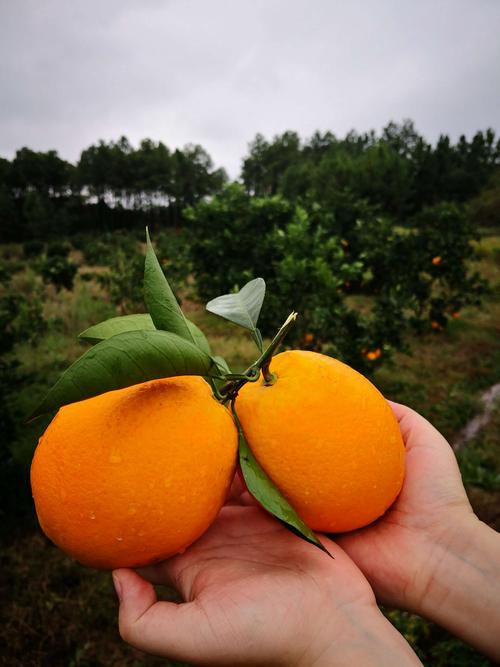
The Grove Where My Boots Still Smell Like Earth: A Navel Orange Story, Unscripted and Unpolished
There’s a spot on my left boot that never fully dries. It’s caked with soil from our grove—dark, crumbly, smelling faintly of citrus and rain. I’ve worn these boots for twelve years, traipsing through rows, kneeling to prune, and stooping to pick. They’re not pretty. They’re scuffed, stained, and hold more stories than any shoe should. But when I walk the orchard in them, I feel grounded—like the earth itself is whispering, “You belong here.”
This is our navel orange grove. Not a brand. Not a business. Just a patch of land we’ve loved, bled for, and let grow wild in its own way. And today, I want to tell you about the oranges that taste like us.
Grandpa’s Boots: The First Imprint
I inherited these boots from my grandfather. They’re a size too big now, but I wear them anyway—his ghost fits inside them, guiding my hands as I work. He bought this land in 1965, a scrappy plot with a few scrawny wild oranges he’d traded a neighbor for. “Oranges don’t care about fancy,” he’d say, kicking dirt from his boots. “They care if you show up. If you listen.”
His first lesson? Dirt is alive. He never used chemicals. Instead, he composted everything: coffee grounds from the diner, banana peels from our kitchen, even the straw we used to bed the horses. “Feed the soil, and it’ll sing,” he’d grin, holding up a handful of black, earthy compost. “Then the oranges will sing with it.”
Today, our soil still sings. Worms curl in my palm when I dig. Ladybugs march in lines across leaves. And the oranges? They taste like that compost—rich, dark, and alive.
A Day in the Grove: No Scripts, Just Rhythms
Farming here is a dance with the sun.
Dawn starts with dew. I slip on my boots, grab a wicker basket, and wander the rows. The air smells like wet leaves and blossoms. I check for aphids (ladybugs usually handle them), adjust irrigation hoses (old, rusted, but reliable), and pause to watch a monarch cling to a blossom, its wings fluttering like a tiny flag.
Noon is for pruning. Grandpa’s old shears hang on my belt now—their handles smooth from 50 years of use. I snip only what’s dead or crossing, never more. “Trees need to breathe,” I murmur, echoing his voice. Last week, I found a nest of baby wrens in a low branch. I left the branch untouched. “They’re part of the orchestra,” I told my son, Mateo, who rolled his eyes but nodded.
Harvest is chaos and joy. Workers—neighbors, friends, even Mateo’s girlfriend, Lila—move slow, baskets slung over shoulders. Lila cradles each orange like a fragile egg. “They’re warmer today,” she says. “Juicier, I bet.” She’s right. Sunlight has been baking their skins since dawn, turning them golden as honey.
Imperfections: The Best Kind of Story
Not every orange is Instagram-worthy. Some have dents from branches, others are lopsided, their tops a little flat. For years, we’d toss them—or sell them cheap. Then Mateo, age 7, brought me one, its peel scuffed like an old map. “This one fought the wind,” he declared. “It’s brave!”
Brave, indeed. Now, we call them “adventure oranges.” They go to the food bank, where a single dad cries, “My kid eats these like candy—their ‘ugly’ oranges are the best.” They go to the elementary school, where kids paint them and call them “citrus superheroes.” And some stay right here, left for deer or squirrels—because even the “imperfect” ones deserve a feast.
What You’ll Taste: More Than Fruit
When you hold one of our oranges, I hope you feel the weight of this place. The sun that baked its skin golden. The rain that plumped its segments. The hands that pruned it gently, the bees that pollinated it, the wrens that nested in its branches.
Bite in, and taste the story. First, the bright tang—like a squeeze of morning lemonade, but warmer, softer. Then, the sweetness unfolds, slow and rich, like honey steeped in summer. The juice runs, thick and golden, not watery. Peel it, and the skin comes away cleanly, leaving no bitter pith—just a faint, citrusy scent that lingers, like a memory of Grandpa’s boots.
Come, Walk With Me
If you’re ever nearby, pull on a pair of muddy boots and join me. I’ll pour sweet tea, hand you a basket, and let you pick. I’ll show you Grandpa’s first tree—its trunk thick, its branches still heavy with fruit. Mateo will teach you to listen for the “thunk” of a ripe orange falling into your hand. And Lila? She’ll insist you try an “adventure orange.” “It’s the best kind,” she’ll say, grinning.
If you’re far away, we’ll pack your order with straw and care—no plastic, no rush. These oranges aren’t perfect. They’re not mass-made. They’re grown by people who show up, season after season, for the land, for the fruit, and for anyone who believes food should taste like it’s rooted in life.
So go ahead. Peel one. Let the juice drip down your chin. And taste the boots, the soil, and the decades of love that made it possible.
Our grove is here. And it’s waiting to share its story—one muddy boot print, one orange, at a time.

No reply content